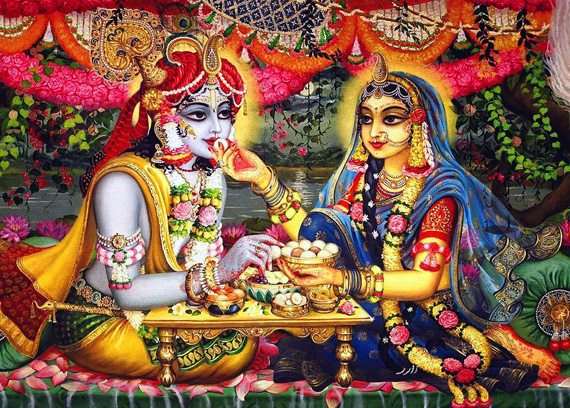Ekadashi

Ekadashi (Sanskrit - "eleven") is the eleventh day (tithi) after the full moon and/or new moon of each lunar month. In the Vedic calendar, ekadashi days are considered particularly auspicious for performing austerities or penances. On ekadashi days, one should fast either completely, without water, or abstain only from grain and legume products.
Ekadashi has special spiritual significance.
How to fast on Ekadashi?
On ekadashi day, according to the Vedas, one should abstain from eating grains and legumes and make special efforts in spiritual practice. The Vedas state that performing spiritual austerities on ekadashi days helps the soul attain liberation from the cycle of birth and death. In addition, ekadashi contributes to physical, mental, and spiritual purification. Ayurveda recommends fasting on ekadashi to maintain and improve health. It is said that fasting on ekadashi prevents and cures many diseases.
Observing ekadashi is one of the cleansing ceremonies established by Vedic scriptures, created for the purpose of spiritual elevation. The power of ekadashi is so great that consistent observance of fasting on these days can lead to the liberation of the individual from the cycle of samsara. Therefore, ekadashi is sometimes called the "best of all opportunities".
Rules of Observing Ekadashi
The best fasting on ekadashi is complete abstinence from food and drink. For those who find this difficult, it is recommended to eat only food that does not contain grains or legumes, preferably once after noon. This meal is called nakta (dinner). It can consist of any root vegetables except beets, fruits, water, dairy products, nuts, sugar, and all vegetables except mushrooms. On ekadashi, one should try to eat and drink only once. In the "Bhagavad Gita," Krishna tells Arjuna that one who fasts completely on ekadashi will receive the full reward, while one who takes nakta will receive only half.
To obtain the full spiritual benefit from fasting, one should avoid daytime sleep, shaving, oil massages, betel nut consumption, eating from bronze utensils, touching a woman during her menstruation period, associating with drunkards, weavers, and washermen. In addition to grains and legumes, one should also avoid consuming: spinach, honey, eggplants, asafoetida, and sea salt (other types of salt, such as table salt, are permissible), as well as eating in other people's homes. Homeopathic medicines can only be taken on ekadashi by the sick. Those who are unable to fast due to serious illness or old age should find a particularly spiritual person and donate something to them. They can also simply listen to or read about the significance of each ekadashi. This practice is recommended as one of the methods to achieve the full result of fasting.
If ekadashi is accidentally not observed, it can be observed on the next day - dwadashi and the fast can be broken on the third day - trayodashi. If ekadashi coincides with dashami - the tenth lunar day, there is no need to restrict oneself with fasting, but if it coincides with dwadashi - the twelfth day of the moon, such ekadashi is called "pure ekadashi" or mahadvadashi and it is recommended to strictly observe it. Mahadvadashi is also usually called ekadashi.
After observing ekadashi, the fast should be broken within 2.5 hours after sunrise on the next day, on dwadashi. According to Vedic scriptures, everyone over the age of five should observe fasting on ekadashi.
Benefits Obtained from Fasting on Ekadashi
The Vedas say that giving charity on the first day of the full moon brings a reward 100,000 times greater than regular charity, and one who gives charity on the day of sankranti (equinox) receives a reward 400,000 times greater than the usual result. However, simply observing fasting on ekadashi allows a person to achieve all these auspicious results.
Furthermore, one who fasts perfectly on ekadashi once deserves the same as someone who feeds 1,000 beggars every day for 60,000 years. A person who observes ekadashi correctly once receives a benefit ten times greater than giving 1,000 cows to brahmanas who are highly knowledgeable in the Vedas.
It should be noted that the reward for feeding one brahmachari is ten times greater than feeding ten good brahmanas in one's home. But one who donates land to a needy and pious brahmana achieves a reward 1,000 times greater than feeding a brahmachari, and 1,000 times greater than this is the reward for giving a pure girl in marriage to a young, well-educated, and decent person. However, ten times more favorable than this is the proper upbringing of children and guiding them on their spiritual path, without expecting any reward. Nevertheless, ten times better than this is to give bread to the hungry. That is, the benefit of observing complete fasting on ekadashi is simply immeasurable or comparable to anything else.
